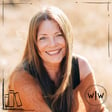Become a Creator today!Start creating today - Share your story with the world!
Start for free
00:00:00
00:00:01

#176 - Joanna Courtney AKA Anna Stuart
Historical, contemporary and romantic fiction author Joanna Courtney joins us on the podcast this week to chat about her latest novels set in World War 2 as well as her previous work in medieval and contemporary fiction. We chat about publishing and the differences between a traditional publisher and a digital first publisher like Bookouture.
💖 Join the Patreon 🙏
Support the show and get access to the extended cuts early and ad-free!
📚 The Chosen Ones and Other Tropes 🥳
Jamie, Melissa and Noami talk about all things writing, tropes and publishing!
✍️ WriteMentor 🧑🏫
Get a whole month with WriteMentor's Hub for free using the coupon code 'Write&Wrong'.
🎙️ Zencastr 🎬
Click on this referral link to get 30% off your first three months with Zencastr.
Transcript
The Role of Writing in Plot Development
00:00:00
Speaker
Ooh, a spicy question. I love it. Because the writing is sort of everything. You can fix plot holes. So some readers love that and some readers are like, but I wanted more of this. So it's kind of a gamble.
Meet Joanna Courtney: Author Introduction
00:00:15
Speaker
Hello and welcome back to the Right and Wrong podcast. On today's episode, I am joined by author of historical, contemporary and romantic fiction, Joanna Courtney, AKA Anna Stewart. Hello, welcome. Hello. Thank you. A little bit of information for everyone listening. This is the second time we're recording this. We ran into some horrible technical difficulties, so so huge thanks to Joe for jumping back on so that we can do this again. And don't worry, it was long enough ago that we both forgot what we talked about, so it'll be fresh and then fun.
Inspiration Behind 'The War Orphan'
00:00:44
Speaker
Let's start, as we always do, with ah your your sort of latest works, um and that is The War Orphan, which came out earlier this year under your pen name Anna Stewart. um Tell us a little bit about it.
00:00:57
Speaker
um So the war orphan is um a novel about some well a number of Jewish orphans who were sort of left um at the end of the war. They'd been in the concentration camps and obviously had lost parents or really touched with any family at all. And there was a um ah a Jewish charity in Great Britain that managed to persuade the government to bring a number of them to this country. And they were put up in um an x sort of in hostels that had been used by factory workers in the Lake District and Lake Windermere and I picked this up when I was researching my ah novel The Midwife of Auschwitz and I was fascinated by the idea of this
00:01:40
Speaker
a huge contrast between the horror, the utter squalor and brutality and terrible suffering in the concentration camps, and then the absolute beauty of of Lake Windermere. And they they arrived in August, so you know, yeah even the weather was good by all accounts. And and the idyll that they were sort of launched into just seemed to me absolutely fascinating. I also had absolutely no idea that that had happened. And I always loved love a little story where it's it's something that I haven't even picked up any notion of at all and I just thought it would be a really fascinating area to explore and find out a bit more about and then i'll ultimately write the novel. Yeah, that's so cool that obviously you've written quite a few books set around the World War II period but it's so cool that you were writing a completely separate book and you kind of just stumbled during your research upon this thing that happened and then that has kind of spun out into its a whole kind of novel of its own.
Finding Inspiration in Historical Research
00:02:35
Speaker
Yes, but that's right um and that's what I love about writing historical fiction really and I think I briefly went into contemporary fiction and wrote two contemporary novels but I kind of found myself heading back towards historical because for me I just I'm fascinated by the past, um I love reading it, I love doing the research and like you say every time I research one novel little nuggets um sort of golden nuggets of other stories appear and I always make, you know, serious little notes going, ooh, possible book, or I send my editor an excited email going, I think I might find another book. And she tells me whether it's ah viable or not. um And then I know to sort of pursue it further. So yes, a number of novels really have been have been generated while I've been researching one that's gone before and hopefully that will continue.
00:03:20
Speaker
Yeah. that's that I mean, that is, like you said, it's one of the great things about historical fiction, that genre, where a lot of the process comes from just you kind of jumping into the text and the the kind of books and everything about to learn about what actually happened and and kind of the setting and stuff like that. And you're like, oh, that's interesting. And I bet there's 101 different tangents that kind of are drawing you in each time you look at everything. Absolutely. it Yes, there are still
From Medieval to WWII: A Genre Transition
00:03:45
Speaker
so many. When I first, so um I used to write medieval fiction, as Joanna Courtney, in fact, I still do. And my editor, my original editor, at Pam McMillan, um left halfway through that series to to move ultimately to book a chore. And we kept meeting up and she kept saying to me, would you like to write World War Two? And I kept saying, no, ah you're all right. And she we'd meet up again the next year and she'd be like, like world world two yeah I was like, no, no, no. Because I really felt that it had been written about so much that there wasn't that much that I could add. And eventually, um she's very persuasive. And um eventually I said, all right, ill I'll have a look. And I had a little riddle around the internet, which I was here.
00:04:23
Speaker
wonderful starting point often. And um something came up about Berlin Zoo and the fact that there were female zookeepers in Berlin. And I always tend to look for the the female angle. And I was like, Oh, that's interesting. I didn't know about that. And I sort of went down that rabbit hole. And that was is ultimately the first first World War II book that I wrote. And yeah, every time I've researched things, I found, I say, other little tangents that you can go off on, made all sorts of little notes, particularly about women and these these fascinating niches, especially once you widen out to sort of the whole of Europe in particular, but um America as well. And then you just find so many little stories of individual things that were going on in this great big wealth of war that and that will always seem worth telling.
00:05:08
Speaker
Yeah, I mean, it would not be the first thing that comes to mind if you tell me about a historical fiction set in World War II like a zoo. It's not something that I would picture immediately, but obviously it makes sense, you know? Yes, and there are obviously wider concerns. You know, there are big battles and there are big fights and big resistance movements going on and keeping a zoo going. You know, maybe you might think, so what? But when you actually tap into the individual stories, there are these people who are fighting their own little mini battles and that's what stories are all about, isn't it? Yeah. And I guess you've done, and all your World War II stuff, is that that's all published ah as Anna Stewart, right? Yes, that's right. And that's about, I counted 11 novels, is that right? Sounds about right, yeah. You take my word for it. yeah Obviously you have like, by this point, you must have a pretty good knowledge of the kind of breadth of World War II. But like,
00:06:03
Speaker
is it Is it the sort of thing where it's such, it was sort of, it went on for a while, it had such a sort of spanning reach culturally across the world that you that you think there will ever ah be a time where you're like, no, I think I've kind of exhausted this, or do you think it does just kind of have limitless potential? I keep thinking what will happen when we get to the end and then I find other little ideas or I have a look back at my folder of possible ideas and go oh yeah that, oh yes that. And like you say I think the fact that, I mean we all all to some extent in Britain get taught World War II in sort of primary school and it's mainly the blitz and it's mainly you know I remember having a wonderful time, I had a brilliant primary school history teacher which might be part of the reason why I'm
00:06:44
Speaker
so keen on history and we she would you know put the lights out and we'd all crawl under the desks pretending there were air raid shelters. So I had quite a vivid concept of that. But there's a very limited um idea of World War II and I never thought really that at that age about Poland or Denmark or Norway or Greece or, you know, what was going on in all these other countries, you like you say, quite different, still European, but quite different cultural contexts. And obviously, um everyone that was affected around the Russian borders. And it it just suddenly you realize that what you think ah of as World War Two can be seen in so many, so many different ways when you look at it, particularly, like you said, from other other countries. And I found that really interesting.
00:07:27
Speaker
Yeah, I guess it's a wherever you are, the lens that you look at World War II is probably very narrow. And to get a broader sense, you do need to kind of cross borders and be like, okay, well, what was it like from this country? What was it like from that country? Yeah,
Upcoming Novel: The Warsaw Uprising
00:07:42
Speaker
exactly. So actually, my next novel that comes out, which um follows on a little bit from, well, both The War or Fernand, the books that preceded it, which was The Midwife of Auschwitz and The Midwife of Berlin, they're all around. um people who've sort of been in the camps, I suppose, largely. And um it's about the Warsaw uprising, which again was something that I discovered had gone on because Anna Kaminski, who is the midwife of Auschwitz, her husband and her eldest son escaped and went to Warsaw and were part of the Warsaw uprising. And that's included really briefly in my novel, The Midwife of Auschwitz. And then I was like, oh
00:08:17
Speaker
That's interesting. What is this Warsaw uprising? And I looked into it and it is this tragic tale of huge bravery where the people of Warsaw rose up to help welcome the Russian Red Army in in the same way as the people in Paris rose up to help the Americans and the British come in and where the Americans and the British went in and three days later the city was liberal. and everyone was partying, basically, I'm afraid the Red Army, for various political reasons, just stopped and left the people of Warsaw to fight against the Germans for 60 long days with all, everyone, the whole population being involved in terrible hardship and attacks. And it's a fascinating story of, you know, huge courage and drama. And it was something that I really enjoyed writing. Oh, and I also, I got to go to Warsaw on the supposed research trip. No, it was a research trip and it was fascinating. It was also a beautiful place, actually. It surprised me. It was lovely. But it was really... I mean, I'd never even heard of it. I'd probably never given Warsaw and what went on in Warsaw a thought. I think we all know that Poland were invaded and that's what sort of started it off. But you don't actually think about what it was like to be in Poland. And I found that really interesting.
00:09:32
Speaker
Yeah, it's the it's the like D-Day and stuff like that will steal the spotlight from these sort of very big events that happened all over Europe. Do you often try to, obviously World War II makes it quite local in terms of short flights. Do you try and visit the various different places that you're writing about when you're when you're when you're working on a novel?
The Importance of Setting in Novel Writing
00:09:50
Speaker
I do, yes, and increasingly now. um So yes, any excuse. But yeah, yeah it it it's great. And as long as it's there, and and Warsaw is particularly strange because the entire place was leveled, bombed, completely destroyed. Even once they chucked to all of the citizens out when the Warsaw uprising failed, they hit the total 80% of all buildings in Warsaw were destroyed. And they rebuilt it, including rebuilding the medieval old town
00:10:19
Speaker
as a medieval old town. So if you go, you can kind of, more this it's almost like a stage set. I mean, it's bricks and everything, but it was all built in the 1950s and 60s, but it looks immaculately as it as it did. um And so that's really fascinating, but I have been to all sorts of nice places um and hopefully I'm writing a novel that's going to be set in America and I've got got plans to do my herarsa first big, well, I've never been to New York ah or Washington, so I've got got plans to visit there at some point under the yeah under the excuse of research. and I will do some research, but I will also enjoy myself.
00:10:58
Speaker
Yeah, I spoke to, I think it was a, it was also a historical fiction author and they were saying one of the, to get the the feel for a setting of a place, almost more than anything else that they did, they would go to that place yeah and they would try all the food. And they said like, there's something about eating the food, eating the like local stuff that will like puts them in that place or transports them there and in a way that they can write it down really kind of naturally more than any other kind of research that they did. i can I can totally see that, yeah, and it's another another good excuse to go to restaurants. here And it's certainly true, you definitely, I mean, when I originally started, like I say, I was writing medieval fiction, and um so I wrote a ah novel that was set in medieval Kiev, but there was no real point in going because it was so utterly different then to now that it wasn't really worth it. Although I also wrote one around William the Conqueror set in Normandy and did go
00:11:56
Speaker
to Normandy because the Normans um were kind enough to build in stone and quite a lot of their stuff um still exists. So I could actually go and stand there. And it was things like I stood um where William the Conqueror waited to go to battle and and looked along and and I hadn't realised before then that they had great big white cliffs, the same as we have in Dover, you know, effectively where the where it split apart many, many moons ago. um and And just those little details where you actually stand and breathe, breathe the air of the place that you're writing about and have a look around and get the idea of the topography, even if sort of the buildings and the cultural stuff has changed. It it does wherever you can. I think, it and undoubtedly, it helps. And it's sort of and a subconscious thing too, I think.
00:12:36
Speaker
Yeah, you get the flavour of it. Yeah, exactly. Literally. um Speaking of yeah the... You mentioned you do write medieval fiction as Joanna Courtney. We've we've established this is a lot of World War II stuff as as Anna Stewart. do you ah What do you write the contemporary stuff under? um So I wrote, and basically, I started life as Joanna Courtney writing medieval fiction, and then I actually, um my agent, got me um an IP project. um okay
00:13:08
Speaker
so um which is effectively what is it is, intellectual property, isn't it? And um the publisher had come up with an idea for a novel that they wanted someone to write and they went to agents and my agent put me forward as an idea because in fact, when I secured my agent many years ago and actually several years before we got a publishing deal, um then she that was for a contemporary novel. And so she kind of knew I could write contemporary, but when we didn't manage to get that one published, I switched to historical, and which we had a bit more success with. So she sort of knew I could do it. So she came to me and said, are you interested in this project? And I was interested and it was it was good. and so But because it was completely contemporary novel, we thought it should have a different name because i did what I didn't really want was someone you know ordering a Joanna Courtney novel expecting to get a 1066 Queens ah type thing and and end up with a a modern love story effectively. And so we decided that a new name would be a better idea. And I wrote that novel and ah and a subsequent and one
Venturing into Intellectual Property Projects
00:14:18
Speaker
under that name. That was for Orion. And then then I was persuaded by my original editor back into World War II and Anna Stewart sort of morphed into a World War II writer. So um I'm not writing any contemporary fiction.
00:14:32
Speaker
at the moment, so you never know what will happen in the future. Okay, okay okay so i I'm really interested in IP work. I've had a few authors who have done a bit of IP work here and there. you know There's a big range with what IP work covers because you can work for a big brand specifically or like in this case, the it sounds like you like you said the publisher had an idea and they were essentially looking for someone to write the idea for them and then... Yeah. So it was um it was lovely it was a lovely idea, in fact. It was based on this very moving letter that um a woman, I think she was an author herself, an American woman, had written to the new yorkk New York Times and she was dying of terminal cancer. And she wrote this really moving letter advertising for a new wife for her husband for when she'd gone because she didn't want him to be on his own and she wanted someone lovely to look after him. It was very, very beautifully done and very moving. And that had inspired this editor and she wanted a novel, she wanted to flip it around and do it the other way with the man looking um ah for a new wife, that future.
00:15:39
Speaker
and um that was all that was all the idea that that she had and she knew that she wanted to have a contemporary strand and he was he was going to be older they were going to be in their 70s and they wanted a contemporary strand and then to drop back to again you know more historical drop back to um a sort of 1960s when they'd first met and sort of explore their relationship that way so that was pretty much all I was given and then I came up with the couple and the sort of situation of their family and um what they did and then also we decided to set it in Liverpool and flash back to the meeting in the 60s in Liverpool because obviously it gives you the cabin club and the Beatles and all of that which was really fun. um so So then I met and we discussed it all and that's sort of how it developed. So I was given a lot of
00:16:27
Speaker
freedom to develop the novel in the way I wanted. So actually I did do another one during Covid. I did a second IP project um for another branch of the people that I write my historical fiction for and they wanted a novel about a couple who basically fallen out with each other on the brink of divorce and then Covid hits and they get stuck in the house for that sort of six weeks of initial lockdown and how they how they work that out. And that was much more specific. And I was given their names and um you know their jobs and how they pretty much wanted the story to unfold. And I did the writing, but I didn't have to do much of the plotting. But then we were working. It was fast. We had to do it quickly to get it out whilst it was still relevant. um yeah so
00:17:11
Speaker
that that was different and both I mean I cut my writing teeth writing short stories to women's magazines and quite often I would be given a um a brief or sometimes used to give me a photo and say this is the photo we want and could you do a story to go with it so i'm I'm quite used to working to someone else's brief so it it doesn't worry me too much. but it but there is a big sort of variation within IP work where it's like sometimes you just get a seed and it's like you can do whatever you want with it and other times it's very prescriptive.
00:17:43
Speaker
Yes. And you give up a certain amount of your rights. and So ah um I think because it's not been your idea, um although you must still have the copyright on the writing, that the they have the idea and I think they can sell it on rather than you being allowed to sell it on. So so you have more restrictive rights if you do it, but it's ah it's a guaranteed it's a guaranteed publication deal. So, you know, it swings around a bit. Exactly. i mean Outside of the rights, when it comes to like the royalties and payments, is it very much the same as if it were you were to release one of your own novels?
00:18:23
Speaker
Yeah, it's the same. Oh, okay. Because i it's one of those things where I'm not sure if it's like you get less because it wasn't your idea or if like it's more of like a one-off lump payment, but if it is just... Certainly, ah no, i did I didn't get less. I still got an advance that um on royalties and in the same way. I think the only restrictions were in in sort of how much you could sell it on or how at least how much of that you got if it's sold on to to other countries or or whatever. Yes. If it had series potential, they wouldn't necessarily have to go to you to write another one. They could get someone else to write another one. I suppose not. No. I don't know. To be fair, when I signed my IP project with Orion, it was a two-book deal and the second book was just my book. That's great.
00:19:11
Speaker
Yeah. That's a great way to get a book deal. Yeah, wasn't it? So yeah, so I wrote their book and then I got to write my book, though obviously in collaboration with them. yeah um But yeah yeah, I wasn't restricted to an IP project second time. So I don't know. Like you say, I think there's many, many ways of of doing it. Lucky I've got an agent who's great and she sort of guided me through some some of that. Yes, that is Kate Shaw. Correct. It's very agency. ah Yes. So wait, how far back was it that you signed with Kate?
00:19:45
Speaker
is eight years ago. I was trying to work it out the other day. I think it was 20... Well, it's not that long ago, I suppose. I think it was 20... I think it was 2014 that... No, 2013 I signed with her and we did our first deal in... twenty No, that's not right. We did our first deal in 2013. So I'd been signed with her for about three years by then. And actually we'd started conversing years before that. I sent her my first novel several years before that and she came as she was working for a different agency then and she came back and said this might have something but it's you know it's not good enough yet so I sent her something else and she said if you thought about this and we kind of went back and forth and we both in that period had babies so we had bits of maternity leave and and we just kept in touch
00:20:30
Speaker
on and off and then eventually I sent her this contemporary one that she liked and she she took me on and then yes we failed to sell it and I switched to historical and then we failed to sell the first historical I wrote because I was interested in 1066 and I actually wrote a novel pre-1066 and everyone came back and said, no, we want if we're going to do 1066, we want actual 1066. So I did a story about Edith, who was the wife of King Harold. um And then my agent, bless her, one of the best things she ever did for me, which she rang me up the day before we were due to submit and said, I've had a thought. People are looking for trilogies at the moment. It was around the Girl with the Dragon Tattoo and um The Hunger Games and that sort of period.
00:21:14
Speaker
and everyone was buying trilogies. And she said, can you come up with two other the books? um And ideally, before tomorrow, so that we can submit this as a series. I was like, what? but And I knew I couldn't do it quadological chronologically, because we'd already failed to sell one that was sort of pretense at six. I was sat there going, And then, I don't know, I was just, again, fiddling around on the internet and suddenly thought, hang on a minute, there were three kings fighting for the throne of England in 1066. They must have had wives. So I had a little search and I found obviously Matilda of Flanders, who was William the Conqueror's wife, who I sort of knew a tiny bit about. And then I also discovered this Elizabetha of Keefe, who was the wife of Harold Hydrada, the Viking challenger. And I was like,
00:21:55
Speaker
Oh, here we go. We put it together and we sold we sold three books just like that. We're not just like that because it had taken years to be honest. yeah yeah and Honestly, when when I got an agent, that was it. I was on the champagne. you know I thought I cracked it and it it took us took us years because it's it's difficult. It's a difficult market and it hasn't got any easier unfortunately. Yeah. Signing an agent is just the first step on this staircase of publishing. Absolutely. Well, I guess finishing a book is. And not even a vital one. You know, you can do it without an agent now, especially with the digital first publishers, because their terms and conditions are pretty pretty standard. There's not much room for negotiation.
00:22:39
Speaker
Yeah, it's sort of up to the individual, it's up to the the the case, because I know Bookature has lots of um authors who don't have agents equally. I know people have sight who have been offered a deal with Bookature or another um digital first publisher and have once they have an offer, then gone to get an agent because they just want that kind of security of knowing that there's someone is kind of looking out for for their kind of assets and things in that in that way. Yeah, ah yeah, it' it's and it depends how you are like, if you've come from, I i know a number of authors who've come from self publishing and might not like relinquishing any of the control. So it all also depends very much on how you operate as a, as a person. Yes, yes, indeed. um But you you're currently with book a chore. Book a chore for my World War Two novels. Yes, I'm with Piotrkis for my yeah my medieval fiction.
00:23:33
Speaker
Okay, so that's this is ah this gives you a great little perspective here because um you've you've you've been and and you've worked with previously ah traditionally published authors, um the kind of what people expect when they say, oh, I'm publishing a book, like it's going to be on a book shelf in a bookshop at some point, but now you're working with bookature.
Publishing: Traditional vs. Digital-first
00:23:50
Speaker
Is it kind of like a big change of pace working with bookature versus a traditional publisher? It is, in all honesty. It suits me down to the ground because it's it's much, much quicker and they are... yeah um I really like working for Couture. They are very efficient. um They give you you know a deadline. you You submit by here and we'll get it back to you by here and then you've got to get it back again. Then it'll go to copy editing. It's all laid out in advance and very rarely. are they you know One or other of us might be late by a few days, but it operates very slickly. It's a very... um they're very sharp business-wise, they're very switched on commercially. um I have a great relationship with my editor, so i'm I'm a planner, so I plan my novel in advance and she'll look at the chapter plan and say, oh, have you thought about this? Usually she tells me to kill someone else halfway through.
00:24:38
Speaker
And so it's it's very collaborative, but yeah, the pace of it is is quite high, but that that suits me. i don't like So i'm writing this year I'm writing three three books, and last year I wrote three books. And um next year I'm hoping to only write two books because it does get does get a bit much, especially with all the research. yeah But I like working at relative pace. I think it's good for me. I think I can, otherwise I just, you know, frilly around. So um I really like that pace and that, you know, you come up with an idea, you plan it, you write it. It's sort of all happening, whereas um with, theatrics are also so great. And I also love my editor there, but it is a very, ah very different process. that It takes ages on and a large, you know, a B format, large paperback comes out, and then it's another six months before the actual sort of commercial paperback comes out and and the whole thing feels much more much more protracted. um But you do get to walk into Wollstone's and see your book on the shelf, which is obviously yeah obviously nice. Although the yeah the print on demand is so good now, that that the you know the actual
00:25:42
Speaker
the print-on-demand novels look ah of the similar quality to a ah fully printed novel. So that I think that's made a big difference. The sheer fact that you can... I think a lot of us are obviously walking into a bookshop and seeing your book on the shelves is an incredible thrill, and you can't get away from that. But I think holding your actual book in your hand is ah is also a huge thrill, and Booker and the other digital first can still offer you that. So I think that's that's made a difference. And going straight to readers is is good. and I have no problem with not having an advance because it often advances a bit of a ah you know a string around your neck. it's is It's a bit you sort of held up to. If you don't earn out your advance, then that's your fault rather than their fault for getting it wrong. so Actually, I quite like not not having an advance and particularly, therefore, having a higher percentage of of the actual sales. Mason Is that with bookage or you don't have an advance?
00:26:35
Speaker
No. oh No. okay No advanced talk. And I think, I can't speak for the other digital first, but I imagine they operate on a very same, but certainly very similar model. it'll um so So no, there's literally no advanced whatsoever, but you get 20% of ah sales. So it's a much higher and they pay you every quarter, bang on. yeah So that it's sort of, it's all it's all a more upfront business model, shall we say. And I quite like that. I guess that's where the the the kind of cost that would go into a physical publication gets redistributed back into you and the company. Yes, and they do a lot of marketing, a lot, yeah particularly, you know, Facebook and and digital marketing and that. And and it's it's very interesting because they don't really do, if you want to do it, they'll support you, but they don't really do things like book launches or book signings and book shops and things. And those things, again, that feel like awfully, but also frightfully embarrassing, um but but feel good, but actually generate know, three sales and that's probably your mates who you persuaded to come along anyway, whereas they're much, much keener on ah really following the algorithms and the data and all of that sort of thing. So they've got huge departments crunching all them all the numbers and working out where it's best to spend the money to actually get the returns, which is a good idea, I think on the whole. but There's nothing wrong with doing a book signing at the bookshop because it does make you feel awfully, which is always nice.
00:27:57
Speaker
Yeah, in some ways it's kind of more for you though than anyone else. It totally is, yeah. Until you're, you know, rich and famous and and then it's for the readers but to yeah not at my stage. Amazing.
Desert Island Book Choice
00:28:11
Speaker
And that brings us to the desert island. So, um Joe, if you were stranded on a desert island with a single book, which book do you hope that it would be? I had to think hard about this because obviously it's ah the thought of only having one book to read would be devastating. And I wondered if you'd allow me to cheat with a Kindle, but I assume that's not playing the game properly. So in the end... Kindle with all the books. That's what you travel with, right? So that's where I'm most likely to end up on a desert island. But um anyway, I think in the end I decided I would have to go with Test of the Durvilles by Thomas Hardy, which is... Okay. I actually did read it again, we haven't read it for years, and I did pick it up again recently, and thought, gosh, this is quite dense compared to, you know, in quite slow paced compared to the sort of novels that were we're very much used to these days. um But um it's beautifully written, the story is heartbreaking, and there's so much to it. And I studied it at a level, not as a text, but around I was doing a different Thomas Hardy novel, and I sort of read it then and then I studied it at university when I did an English literature degree and found out all sorts of little things about it. And so it has a sort of a place in my heart, I suppose. I also, I think I read it as a teen over as well, because I remember a particularly bizarre um day with, I told my little sister all about it. And then we had a weird baptism of her doll, which I think was a bit reminiscent of the seceded in Tesla de Vils where they baptized the baby because he's going to die. So um clearly it's been creeping through all elements of my life. So I think I would
00:29:45
Speaker
I would take that with me because at least there's there's lots to it. It's a meaty novel. They're very sad. I mean, happier, but anyway. I mean, for me, there's no greater greater endorsement in a novel than it having survived you studying it on an academic basis and still liking it. That is true. Once you've torn something apart, it's a miracle that you still like it, isn't it? Exactly. Yeah. And you're desperately trying to like write essays about it and trying to find meaning in like a totally meaningless sentence. ah Yes, that is some patterns. and And yes, I would love Sunday. Yeah, wouldn't it be amazing if you get to the stage where someone actually analyzes your novel? In fact, you know, I had a letter from three girls from a high school in in America. And they'd obviously they'd picked my novel Midwife of Auschwitz. to study as part of their sort of study group. I don't i don't know what age they were. I think they're probably about 11, 12 and um so quite hard. it's quite There's some quite hard-hitting stuff in that novel. ah So they wrote to me and um they could sit I could see that they had obviously um
00:30:50
Speaker
spent loads of time and they'd been told how to do it. So they were like, I really liked this sentence, this spoke to me. and And I liked the way that you created characters, or you know, you could see them studying in the system is at a very basic level. But it would be amazing to see someone at ah at a higher level analyzing your work and going, I think they put in this pattern and this resonance, you know, and you're like, um Oh, no, it didn't actually, but it's great that you picked out I don't know how much they would pick up on that you didn't. create So wouldn't it be fascinating to be able to talk to, for example, Thomas Hardy and say, did you intend to put these so motifs in or did they just come out of his subconscious? But that sadly cannot be.
00:31:28
Speaker
I think it's a lot of like, that like, oh, you look at this incredible intricate thing that you did here and you're like, yes, yes, that was the purpose. I'm so clever. Never even thought about it. I am good, aren't I? Exactly. Amazing. um I have some more questions about the writing process and research for historical settings and fun stuff like that. But this is the end of the regular episode and that will all be in the extended episode available on Patreon. um Exactly. but yeah and it's that's a sign joy
00:32:01
Speaker
separate in the podcast but It's been great chatting with you again, Joe. Thanks so much for coming back on and and speaking with me. It's been awesome learning all about your career and your writing and everything that you've got going on. It's been great. Thank you very much. It was lovely to chat to you. And for anyone listening, if you want to keep up with what Jo is doing, you can follow her on Twitter, at Anna Stewart Books, or on Instagram and Facebook, at Anna Stewart Author. She also has a website, annastuartauthor.com. To support the podcast, like, follow, subscribe on your podcast platform of choice, and follow along on all socials. Join the Patreon for extended episodes ad-free and a week early, and check out my other podcast, The Chosen Ones and Other Tropes. Thanks again to Jo, and thanks to everyone listening. We will catch you on the next episode.



















